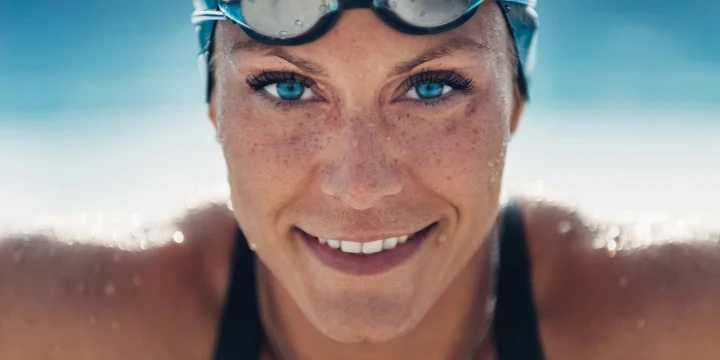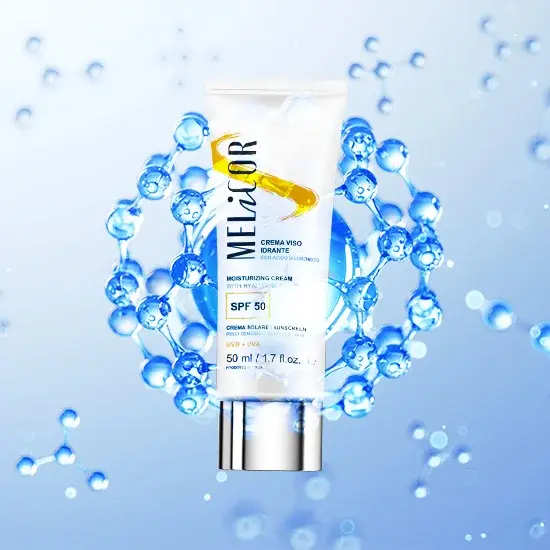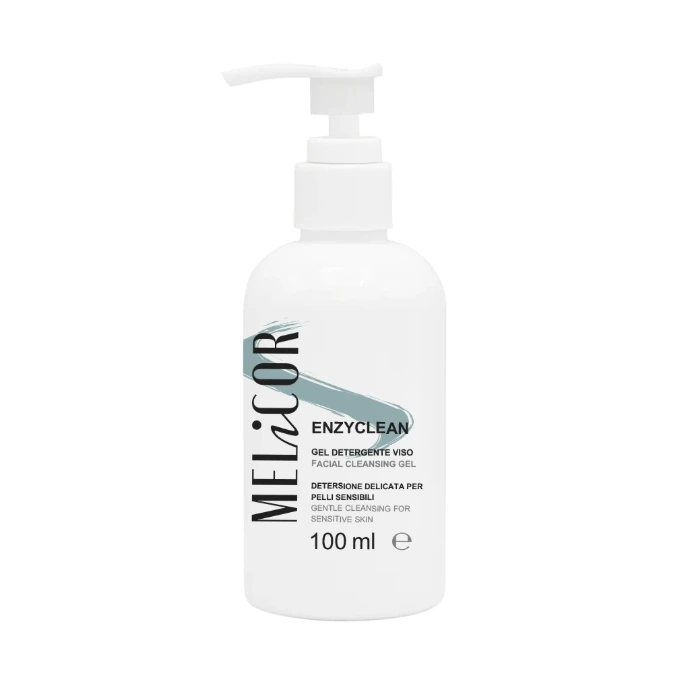Photoaging is one of the main factors that contribute to the premature aging of the skin. Unlike natural aging, which is influenced by time and biological processes, photoaging is caused by exposure to UV rays from the sun. This process accelerates the appearance of wrinkles, dark spots, and loss of skin elasticity, making the skin more fragile and prone to damage.
Sunscreen plays a crucial role in preventing photoaging. Its UV filters protect the skin from UVA and UVB rays, reducing oxidative stress and preventing visible signs of premature aging. Daily application of sunscreen isn’t just a cosmetic step—it’s a vital strategy for maintaining healthy, radiant skin over time.
In this article, we'll explore the causes and effects of photoaging, how UV filters work, how to choose the best sunscreen, and effective skincare practices to maintain youthful skin. If you want to protect your skin from sun damage and maintain its healthy glow, keep reading!

Signs of Photoaging
Photoaging is a gradual process that alters the structure and appearance of the skin due to exposure to UV rays. Over time, its effects become increasingly visible, with symptoms varying in severity depending on the level of sun exposure and the use of protective measures.
Wrinkles and loss of elasticity
UVA rays penetrate deep into the skin, damaging collagen and elastin, two essential proteins responsible for skin firmness and elasticity. As a result, fine lines and deep wrinkles begin to form, particularly on areas most exposed to sunlight, such as the face, neck, and hands. Over time, the skin loses elasticity, appearing less toned and more relaxed.
Dark spots and hyperpigmentation
Prolonged UV exposure stimulates excessive melanin production, leading to the formation of dark spots, also known as solar lentigines. These pigmentation irregularities typically appear on the face, décolleté, and hands, making the skin look more uneven. Regular use of high-SPF sunscreen helps prevent these changes and maintains an even complexion.
Dryness and skin thinning
UV damage weakens the skin's protective barrier, causing dehydration and persistent dryness. Additionally, thinning of the skin makes it more susceptible to environmental aggressors and premature aging. Applying sunscreen enriched with hydrating ingredients helps maintain the skin’s protective layer, keeping it soft and healthy.

Understanding these signs is crucial for establishing an effective routine against photoaging. Taking early action can significantly slow down premature skin aging and maintain a healthy complexion. In the next section, we'll explore how sunscreen functions as a preventive and protective measure, shielding the skin from UV damage while helping preserve its youthful appearance.
The role of Sunscreen in preventing Photoaging
Sunscreen is your best defense against photoaging, shielding your skin from damage caused by UVA and UVB rays. Consistent use of sun protection minimizes exposure-related damage, keeping your skin youthful and healthy over time .
How sunscreen filters work
Sunscreen filters create a protective barrier that absorbs, reflects, or disperses UV rays before they can penetrate the skin. There are two main types of filters:
- Chemical filter: absorb UV rays and transform them into heat, neutralizing their harmful effects.
- Physical (mineral) filters: - Form a protective layer on the skin that reflects sunlight, preventing UV penetration.
The effectiveness of sun protection depends on the combination of these filters and their ability to block both UVA and UVB rays, the primary culprits behind photoaging.
SPF and protection against UVA & UVB rays
The SPF (Sun Protection Factor) rating indicates how well sunscreen protects against UVB rays, which cause sunburn and surface-level damage. However, for complete protection, it's essential to choose formulas that also shield against UVA rays, which penetrate deep into the skin, accelerating photoaging.
A sunscreen with SPF 30 or higher and broad-spectrum protection ensures effective defense against both types of UV radiation.
Daily use Is essential – even on cloudy days
Many people underestimate the importance of daily sunscreen application, especially in cloudy weather or during colder months. However, UVA rays are present year-round, capable of penetrating clouds and windows, leading to photoaging even without direct sun exposure.
Applying sunscreen daily, regardless of the weather, is a key strategy for maintaining youthful skin and preventing long-term damage.
How to choose the right sunscreen
Selecting the right sunscreen depends on various factors, including skin type, specific needs, and daily activities. Choosing a product with the optimal combination of UV filters, active ingredients, and broad-spectrum protection is crucial for preventing photoaging and keeping your skin healthy.
Types of Sunscreens and their characteristics
There are two primary categories of sunscreens:
- Chemical sunscreens: contain UV-absorbing filters that neutralize harmful radiation by converting it into heat. These formulas are lightweight and easy to apply, making them ideal for daily use .
- Physical sunscreens (mineral): use ingredients like titanium dioxide and zinc oxide, forming a protective shield that reflects UV radiation. These sunscreens are ideal for sensitive skin.
- Sunscreen formulations – cream, gel, or spray: cream - offers deep hydration, making it suitable for dry skin; gel - lightweight and non-greasy, perfect for oily or acne-prone skin; - spray - provides quick and easy application, ideal for on-the-go protection.

Melicor: Moisturizing face cream SPF 50 for sensitive skin
Moisturizing face cream - two levels of hydration
The facial moisturizer is designed to protect skin cells from the negative effects of dry climate and ultraviolet radiation.
Key ingredients to look for
For effective protection against photoaging, it is essential to choose sunscreens with the right combination of active ingredients:
- UVA & UVB filters: provide broad-spectrum protection to prevent sunburn and premature aging .
- Antioxidants (vitamin C, vitamin E, niacinamide, silymarin): combat oxidative stress caused by UV exposure, helping maintain a radiant complexion .
- Hyaluronic Acid stabilized form: - Unlike traditional hyaluronic acid, its stabilized form offers long-lasting hydration and photoaging protection. This advanced molecule is designed to resist UV degradation, ensuring deep and prolonged moisture retention. Additionally, it stimulates collagen production, improving skin elasticity and reducing wrinkles and aging signs.
- Ectoin: an innovative ingredient with protective and hydrating properties. Ectoine is a natural molecule found in extremophilic bacteria, known for surviving harsh environmental conditions. It forms a protective barrier on the skin, stabilizing cell membranes and preventing moisture loss. Additionally, it has been shown to reduce inflammation, shield against UV-induced damage, and enhance skin integrity. While not a UV filter, ectoine minimizes the effects of photoaging, making it a valuable addition to sunscreens and anti-aging skincare products.
Choosing the right Sunscreen for different skin types
- Dry Skin: opt for hydrating sunscreens enriched with shea butter, sunflower oil, stabilized hyaluronic acid, and ectoine, which help nourish the skin and protect against dehydration and photoaging.
- Oily or acne-prone skin: choose lightweight, oil-free, and non-comedogenic formulas to prevent clogged pores and breakouts.
- Sensitive skin: mineral sunscreens containing zinc oxide help reduce irritation while offering effective UV protection.
- Mature Skin: look for antioxidant-rich products containing collagen-boosting ingredients for an anti-aging effect .
Selecting the right sunscreen is crucial to protecting your skin from photoaging and preventing long-term damage.
Additional tips to prevent photoaging
In addition to daily sunscreen application, other habits can help protect the skin from photoaging and maintain youthful skin for longer. Incorporating a consistent skincare routine and a nutrient-rich diet can significantly impact skin health.

Daily habits to protect your skin
- Limit sun exposure between 10:00 AM and 4:00 PM, when UV rays are strongest and can cause significant skin damage.
- Wear UV-protective accessories protect your face by wearing wide-brimmed hats and UV-blocking sunglasses, which reduce exposure to harmful radiation .
- Use sun-protective clothing opt for UV-blocking fabrics or tightly woven materials to minimize UV absorption and protect your skin effectively .
- Apply sunscreen indoors too, many don’t realize that UVA rays can penetrate windows and glass surfaces, contributing to photoaging even indoors. Always apply sunscreen, regardless of your location.
The role of antioxidants and a nutrient-rich diet
Antioxidants are crucial in fighting oxidative stress induced by UV rays, helping prevent cell damage and skin aging. Incorporating key nutrients into your diet can enhance natural skin defense mechanisms:
- Vitamin C: stimulates collagen production and protects against free radicals. Sources: citrus fruits, bell peppers, kiwi .
- Vitamin E: helps moisturize and repair the skin. Sources: nuts, olive oil, sunflower seeds.
- Beta-carotene: enhances skin resistance to UV exposure. Sources: carrots, pumpkin, sweet potatoes.
- Licopene: a powerful antioxidant found in tomatoes, apricots, pink grapefruit, and carrots. Lycopene neutralizes free radicals, protecting the skin from sun damage and reducing the risk of photoaging. It also boosts natural UV defense, helping maintain elasticity and a radiant complexion.
- Polifenols (found in green tea and cocoa) : combat oxidative damage and enhance skin protection .
A nutrient-rich diet significantly improves skin health, increasing resilience against photoaging effects.
The importance of hydration and a proper skincare routine
- Drink at least 2 liters of water daily to support skin hydration and cell regeneration.
- - Use hydrating creams with stabilized hyaluronic acid, ceramides, and sunflower oil to maintain skin elasticity and moisture levels.
- - Apply antioxidant-rich serums containing Vitamin C and Niacinamide to boost skin defenses.
- Follow a gentle cleansing routine - to remove impurities and prep the skin for protective treatments.

Enzyclean facial cleansing gel for sensitive skin
Facial cleansing gel for sensitive skin. Removes impurities and does not dry the skin, thanks to a combination of papain with extracts of aloe, oats and mallow.
A combination of daily sunscreen use, antioxidant support, and hydration ensures long-term skin health and prevents photoaging effectively.
Conclusion
Photoaging is a process that can affect both skin health and appearance over time. As we’ve discussed, exposure to UVA and UVB rays accelerates the formation of wrinkles, dark spots, and loss of elasticity, making the skin more fragile and prone to visible aging.
The solution? Incorporating sunscreen into your daily routine! Whether the sky is cloudy or you spend most of your time indoors, UV rays are always present, and consistent protection is the key to preserving youthful skin.
Choosing a sunscreen with SPF 30 or higher, broad-spectrum defense, and antioxidant-rich ingredients can make a significant difference in maintaining healthy, radiant skin. In addition to sun protection, habits like a nutrient-rich diet, a proper skincare routine, and regular hydration help strengthen the skin’s natural defenses.
Now that you understand the importance of prevention, it’s time to take action! Protect your skin daily by selecting the right sunscreen for your needs. With small but consistent habits, you can combat photoaging and maintain a youthful complexion for years to come.
Literature
- Guan LL, Lim HW, Mohammad TF. Sunscreens and Photoaging: A Review of Current Literature. Am J Clin Dermatol. 2021 Nov;22(6):819-828. doi: 10.1007/s40257-021-00632-5. Epub 2021 Aug 13. PMID: 34387824; PMCID: PMC8361399.
- Gabros S, Patel P, Zito PM. Sunscreens and Photoprotection. [Updated 2025 Mar 28]. In: StatPearls [Internet]. Treasure Island (FL): StatPearls Publishing; 2025 Jan.